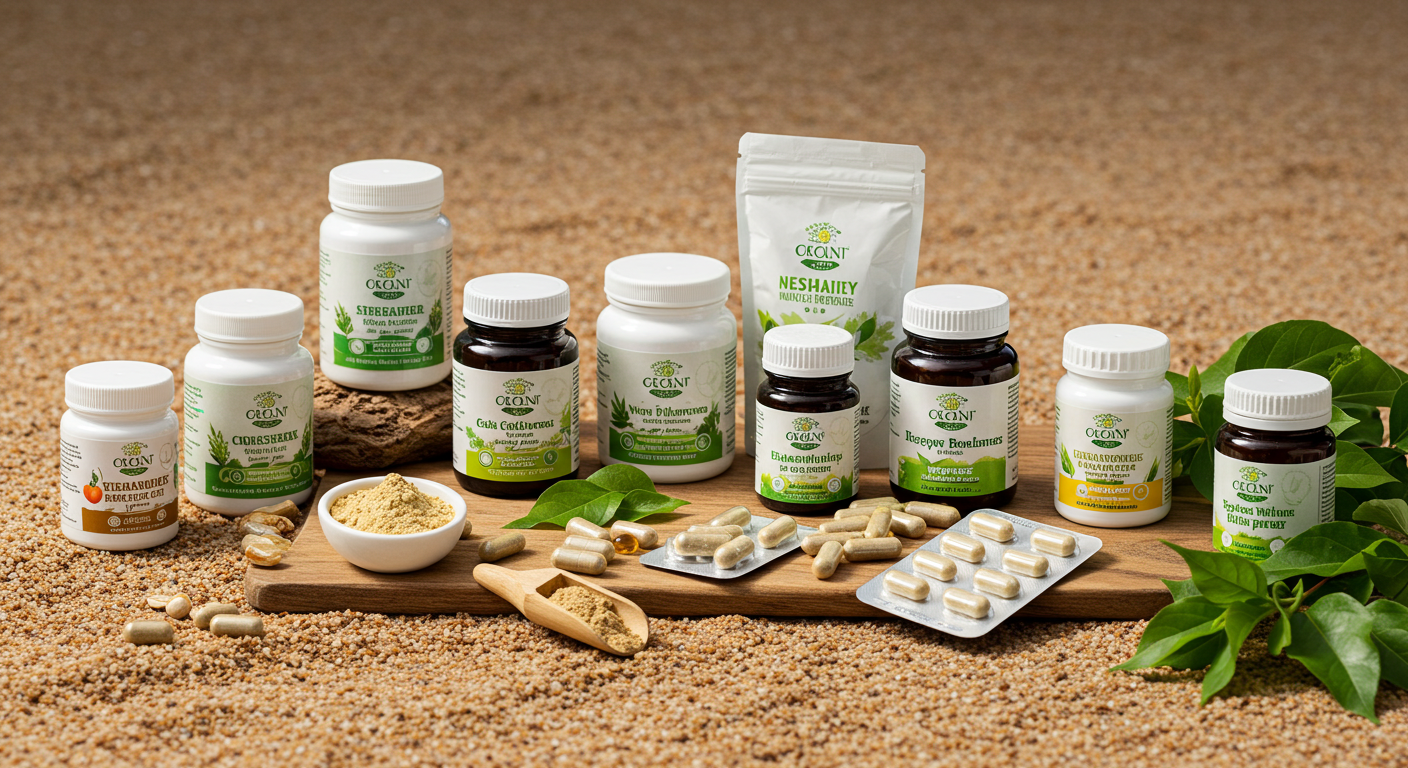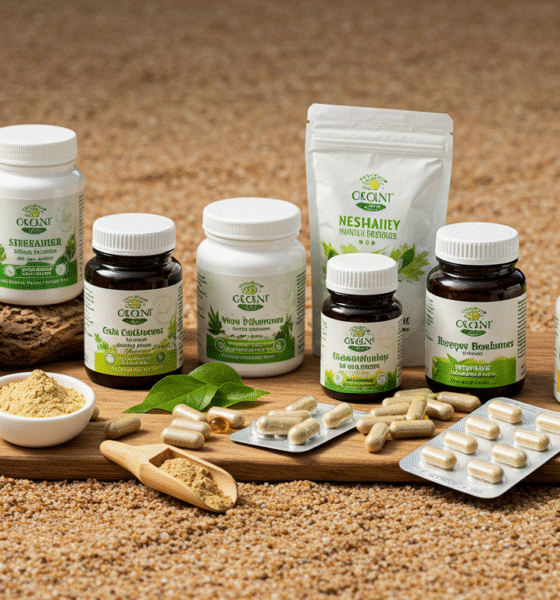

Features
Eco-Friendly Sustainable Supplements: Green Health Approach
Something that we wanted to cover this week at Blue and Green Tomorrow is the growing interest in eco-friendly dietary supplements. You might already know that 74% of U.S. adults use supplements, according to the Council for Responsible Nutrition. There are growing concerns not only about what people put in their bodies but also about how those products are made. It is easy to overlook the environmental cost behind packaging, manufacturing, and shipping.
You can see that many people want to make greener choices, yet they often lack the tools to do so. It is reported by Doconomy that 62% of U.S. citizens feel unable to make sustainable decisions. You may find shelves full of products labeled “natural,” but not all of them have low environmental footprints. Keep reading to learn more.
Waste, Emissions, and the Hidden Cost of Supplements
There are hidden environmental impacts tied to supplement production and disposal. You might not realize that when food and supplement ingredients go to waste, the damage adds up fast. A United Nations report shows that rotting food contributes more than 8–10 percent of global greenhouse gas emissions. It is no small issue when a supplement expires on a shelf or sits unused.
You may be wondering how to spot brands that are more earth-conscious if you want weight loss supplements. It is helpful to look for companies using compostable packaging or renewable sourcing methods. There are a growing number of suppliers working with recycled containers and minimal packaging. You also want to check if brands partner with regenerative farms or support fair-trade sourcing.
It is common for people to assume that “green” always means “organic,” but the two are not interchangeable. You can find organic products that still use plastic containers or ship with excess packaging. There are brands marketing themselves as natural while making little effort to reduce emissions. You have to look beyond the label to make informed choices.
You might feel overwhelmed by all the choices, but even small changes matter. It is better to support companies that disclose their sustainability practices than to settle for vague buzzwords. There are simple steps like choosing refillable jars or bulk options that cut down waste. You don’t need to be perfect to make a positive difference.
In an era where climate change, pollution, and overconsumption are pressing global concerns, many consumers are reevaluating their habits, from the food they eat to the vitamins they take. One major trend gaining momentum is the use of eco-friendly, sustainable supplements. These are dietary products developed not only to boost health and wellness but also to protect the environment and support ethical sourcing practices.
In this read we will explore the rise of sustainable supplements, what makes them eco-friendly, and how you can make greener choices when buying your next bottle of vitamins.
What Are Eco-Friendly Sustainable Supplements?
Eco-friendly supplements are health products made using environmentally responsible practices. This includes how ingredients are sourced, how the product is manufactured, how it’s packaged, and how it affects ecosystems and communities. Sustainability in this context means that the supplement can be produced and consumed long-term without depleting natural resources or causing harm to the planet.
To qualify as sustainable, a supplement generally meets several criteria:
-Ingredients sourced through ethical and renewable means
-Minimal or no use of harmful chemicals or synthetic additives
-Eco-conscious packaging (biodegradable, recyclable, or refillable)
-Cruelty-free and often vegan
-Manufactured using low-carbon, energy-efficient processes
Why Sustainability in Supplements Matters
1. Environmental Impact of Traditional Supplements
Many mainstream supplements rely on mass farming, overfishing, or synthetic chemical production—processes that can harm biodiversity and contribute to pollution. For example:
-Fish oil capsules may contribute to the depletion of marine life.
-Overharvesting of herbs like ashwagandha or turmeric can lead to soil degradation.
-Single-use plastic bottles contribute to plastic waste.
By contrast, sustainable supplements seek to minimize these negative impacts, often by using plant-based alternatives, lab-cultured nutrients, or ethically sourced raw materials.
2. Human Health and Safety
Eco-friendly supplements also tend to be free of toxic fillers, synthetic binders, or harmful preservatives, which can lead to long-term health issues. Cleaner ingredients mean better bioavailability, meaning your body absorbs them more effectively.
3. Ethical Consumerism
Buying sustainable supplements supports companies that prioritize fair labor practices, local communities, and biodiversity conservation. It sends a message to the industry that consumers value transparency, ethics, and responsibility.
Key Features of Sustainable Supplements
When shopping for eco-friendly supplements, here are the top indicators to look for:
1. Plant-Based or Vegan Formulas
Animal-based ingredients like gelatin or fish oil can have significant environmental footprints. Vegan alternatives such as algae-based omega-3, plant protein, and herbal extracts offer a greener solution.
2. Certified Organic Ingredients
Organic farming avoids synthetic fertilizers, pesticides, and genetically modified organisms (GMOs), making it better for soil health and pollinators like bees. Look for USDA Organic or EU Organic labels.
3. Sustainable Packaging
Many eco-friendly brands are moving away from plastic and opting for:
-Glass containers
-Compostable pouches
-Recyclable aluminum tins
-Minimal or no outer packaging
4.Third-Party Certifications
These seals help verify the brand’s sustainability claims:
-Non-GMO Project Verified
-Certified B Corporation
-Fair Trade Certified
5. Transparent Supply Chain
Ethical brands often offer traceability, showing where their ingredients are grown, how they’re harvested, and under what working conditions.
Examples of Sustainable Supplements
Here are a few types of sustainable supplements and how they help reduce environmental harm:
1. Algae-Based Omega-3
Traditional omega-3 supplements come from fish oil, which contributes to overfishing and oceanic imbalance. Algae-based omega-3 offers the same benefits—EPA and DHA fatty acids—without harming marine ecosystems.
2. Organic Protein Powders
Many conventional protein powders are dairy-based, requiring intensive animal farming. Plant-based proteins from hemp, peas, or rice are more sustainable, often requiring less water and land.
3. Mushroom Supplements
Mushrooms like reishi, chaga, and lion’s mane are fast-growing, carbon-sequestering fungi that provide immunity and brain support. Companies like Four Sigmatic and Host Defense emphasize sustainable harvesting and packaging.
4. Herbal Adaptogens from Regenerative Farms
Adaptogens such as ashwagandha, rhodiola, and holy basil are often used to balance stress and support the endocrine system. Brands that use regenerative farming help restore soil quality and promote biodiversity.
How to Make Eco-Friendly Supplement Choices
If you’re looking to switch to more sustainable supplements, consider the following steps:
1. Do Your Research
Read the label. Visit the brand’s website. Look into ingredient sourcing and company ethics. Look for transparency, certifications, and manufacturing practices.
2. Choose Minimal Packaging
Select products that offer refill options, bulk packaging, or recyclable materials. Avoid single-use plastic where possible.
3. Support Local and Independent Brands
Smaller local producers often have a lower carbon footprint and may source ingredients more responsibly than mass-market brands.
4. Buy Only What You Need
Avoid overstocking. Supplements can expire and waste resources. Track your needs and use accordingly.
5. Properly Dispose of Packaging
Compost biodegradable pouches, recycle containers correctly, and avoid tossing bottles into general waste.
Challenges in the Sustainable Supplement Industry
Despite the promising trend, there are still challenges:
Greenwashing: Some companies falsely claim eco-friendliness without real action. Always verify claims.
Higher Cost: Sustainable supplements can be more expensive due to ethical sourcing and certifications.
Limited Availability: Not all eco-friendly brands are widely available, especially in rural or developing areas.
However, increasing demand is driving growth, and economies of scale may eventually make sustainable supplements more accessible and affordable.
The Future of Eco-Friendly Supplements
The supplement industry is expected to grow to over $300 billion globally by 2030. With rising consumer awareness about the environment, the future will likely feature:
More biodegradable packaging innovations
Increased use of lab-grown nutrients to avoid resource depletion
Broader implementation of blockchain for supply chain transparency
Greater government regulation to define and protect eco-labeling
Eco-friendly supplements are not just a trend—they are a necessity in the face of climate challenges and health-conscious living.
The Takeaway
Switching to eco-friendly, sustainable supplements is a small but powerful way to align your wellness routine with the health of the Earth. By choosing products that support environmental preservation, ethical sourcing, and clean manufacturing, you’re not just taking care of your body—you’re helping to ensure a livable planet for future generations.
Make the change today—read your labels, ask questions, and support brands that care about more than just profits. Sustainability starts with the choices we make, one capsule at a time.


 Environment12 months ago
Environment12 months agoAre Polymer Banknotes: an Eco-Friendly Trend or a Groundswell?

 Features11 months ago
Features11 months agoEco-Friendly Cryptocurrencies: Sustainable Investment Choices

 Features12 months ago
Features12 months agoEco-Friendly Crypto Traders Must Find the Right Exchange

 Energy11 months ago
Energy11 months agoThe Growing Role of Solar Panels in Ireland’s Energy Future


























